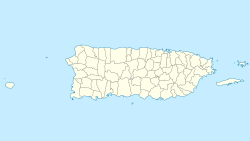Rosaly-Batiz House
|
Rosaly–Batiz House
|
|

The Rosaly–Batiz House in Barrio Primero
|
|
|
Location in Puerto Rico
|
|
| Location | 125 Villa St./ Corner of Mendez Vigo St., Ponce, Puerto Rico |
|---|---|
| Coordinates | 18°00′39″N 66°36′55″W / 18.01072°N 66.61522°WCoordinates: 18°00′39″N 66°36′55″W / 18.01072°N 66.61522°W |
| Area | 0.3 acres (0.12 ha) |
| Built | 1897 |
| Architect | Manuel V. Domenech |
| NRHP Reference # | 86002768 |
| Added to NRHP | September 29, 1986 |
The Rosaly–Batiz House (Spanish: Residencia Rosaly-Batiz) is a historic building located on Villa street in Barrio Primero in Ponce, Puerto Rico, in the city's historic district. The building dates from 1897. It was designed by Manuel V. Domenech, a Puerto Rican architect that was responsible for designing various other now-historic buildings. Domenech built this residence for Ponce mayor Pedro Juan Rosaly. Domenech himself became mayor of Ponce and held numerous other political positions in Puerto Rico. The Batiz Residence is a monument to a great man and his works and a vivid reminder of the aristocracy of the years prior to the Great Depression.
The Batiz Residence was built in 1897 by the renown engineer Manuel Domenech for the Mayor of the City of Ponce, Don Pedro Juan Rosaly. A native of Ponce, Domenech graduated from the prestigious Rensselaer Polytechnic Institute of New York and was responsible for many of the island's most lavish turn-of-the-century buildings.
Among Domenech's other designs are the Caryatid House (1910) which faces the Ponce Cathedral and the "Asilo de Pobres" (listed in the National Register on 2 December 1985). Domenech was also Mayor of the City of Ponce and held many governmental positions in Puerto Rico.
Although a particular style cannot be attributed to Domenech, the vocabulary of his designs ranged from the purest Neoclassical to the most intricate eccletic. In this case, Domenech referred to the Renaissance Italian Palazzo as a model, a theme repeated in other properties both in Ponce and Mayaguez. However stern, the Batiz Residence displays a greater degree of mannerism over eclecticism, resulting in one of Ponce's most distinguished structures.
...
Wikipedia

